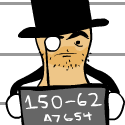Kurzon posted:I wonder why it was so important for him to prove that to the Joker. Because the entirety of Joker's plan was trying to prove how meaningless that sort of morality is, and Gordon thinks it's the biggest "gently caress you" possible to still do the right thing after what Joker did to him. Kurzon posted:I interpreted it as a subtle dig at past Batman conventions. This was a couple of years after Moore wrote, Watchmen, remember. Perhaps Moore was mocking the ridiculousness of a city official having an open relationship with a vigilante and pretending it was all legal. You seem determined to read the story against the authorial intent.
|
|
|
|
|

|
| # ? Apr 24, 2024 13:53 |
|
Kurzon posted:I interpreted it as a subtle dig at past Batman conventions. This was a couple of years after Moore wrote, Watchmen, remember. Perhaps Moore was mocking the ridiculousness of a city official having an open relationship with a vigilante and pretending it was all legal. It can be both. From a character reading, I think it's Gordon trying to cling to his sanity for reasons I stated above, but for a reader there is definitely a level of satire and hypocrisy in the entire set-up of the story. Moore's a cynical bastard.
|
|
|
|
Lurdiak posted:You seem determined to read the story against the authorial intent.
|
|
|
|
Franchescanado posted:I think it's more he's trying to prove it to himself. His world view has been distorted, his life at that point is full of suffering, and his best companion's trust and intentions has been called into question. The only way he can cling to his sanity is to believe that his life hasn't been lived in vain, and that their way works. The obvious conclusion is that Gordon did snap. Holding onto "our way" is his madness. It ties pretty well into the joke. Lurdiak posted:You seem determined to read the story against the authorial intent. The author is dead. Long live the Reader. BravestOfTheLamps fucked around with this message at 13:36 on Jul 28, 2016 |
|
|
|
This just in: Spergs on the internet don't understand artistic interpretation and will only take the author's intent as law, EXTREE EXTREE!
|
|
|
|
BravestOfTheLamps posted:The author is dead. Long live the Reader. Within reason. It must work within contextual evidence of the text. For instance, saying The Killing Joke is a commentary on police brutality and the Black Lives Matter movement because of three panels on the fourth page of the story does not hold weight. Death to the Author, but the Reader is Not God. We all bring our live experiences to each reading, but we must be able to argue our point with real evidence beyond "that's how I interpret it".
|
|
|
|
He also could've intended that ending and just didn't explicitly spell it out I the script, possibly to get it past DC editorial.
|
|
|
Unmature posted:This just in: Spergs on the internet don't understand artistic interpretation and will only take the author's intent as law, EXTREE EXTREE! I understand artistic interpretation just fine, but trying to read everything against both the explicit text and the script and then alluding that your interpretation is supported by your understanding of the author's politics or personality is dumb as dog poo poo. I'm sorry that makes you upset and makes you feel the need to call me names.
|
|
|
|
|
Lurdiak posted:I'm sorry that makes you upset and makes you feel the need to call me names. Everyone here calls you names.
|
|
|
|
Babies. Why was Baron Bifford banned again?Black Mage Knight posted:I apologize for misreading it then. I just always took the sudden stop to laughter to imply a strangling.
|
|
|
|
Kurzon posted:It's not easy to strangle someone to death. You have to be massively stronger, and even then it can take as long as 10 minutes (source: some books I read on the Camorra). Batman would not have been able to kill the Joker before the cops stopped him. Are you using real life logic and science to explain why something wouldn't work in a comic book? Come on, son.
|
|
|
Unmature posted:Everyone here calls you names. Someone got up on the stupid rear end in a top hat side of the bed this morning!
|
|
|
|
|
Just for the record, Moore himself explained his intention behind the end of the story last yearAlan Moore posted:And David, for the record, my intention at the end of that book was to have the two characters simply experiencing a brief moment of lucidity in their ongoing very weird and probably fatal relationship with each other, reaching a moment where they both perceive the hell that they are in, and can only laugh at their preposterous situation. A similar chuckle is shared by the doomed couple at the end of the remarkable Jim Thompsonís original novel, The Getaway.
|
|
|
|
It's also possible that the idea to explicitly kill The Joker was mostly Bolland's. The book, after all, was his inception and it was him who wanted to bring Alan on to write it, and it's Bolland who repeatedly teases the ambiguous ending in the afterword. If you compare the script to the final page, a few things are off. Most notably, the crucial 5th panel on the last page doesn't match the description in the script. The script describes Batman and Joker as "collapsing forward onto each other, both ragged and bloody". That's not what's happening at all! They aren't leaning on each other. The script makes no mention of the sudden dramatic shift in lighting to make Batman look like a monster, or that the laughter should become so hysterical that it breaks out of the word balloons and you can no longer tell who's laughing. This is of course the panel that Bolland highlights in his afterword simply by repeating it.  According to the script, we shouldn't see The Joker's hand in panel 6 at all, but it's there nonetheless to illustrate it relaxing from panel 5. Kurzon posted:It's not easy to strangle someone to death. You have to be massively stronger, and even then it can take as long as 10 minutes (source: some books I read on the Camorra). Batman would not have been able to kill the Joker before the cops stopped him. This is a really stupid post BUT it does lead us to the much cooler theory that Batman doesn't actually break The Joker's neck, he kills The Joker with The Joker's own super fast acting paralytic Joker toxin seen from earlier in the book. In their final fist fight, the second panel is of Batman kicking The Joker's toxin buzzer out of his hand. In the next page, Batman is seen picking himself off the ground and he spends half the page then staring at his hand. Why's Batman staring at his hand? Has he got something in there? It's really weird! And this isn't mentioned in the script either. If you imagine that final shot of silhouette Batman is not of him grabbing The Joker, but stabbing The Joker with Chekhov's toxin buzzer, everything in the book finally makes sense.
|
|
|
|
Equilibrium posted:This is a really stupid post
|
|
|
|
Franchescanado posted:Within reason. It must work within contextual evidence of the text. It is possible for a reading to discover implications for cultural formations and events unknown at the time of first publication. It doesn't mean that anyone was thinking about it while writing, but that the past sometimes hits on ideas relevant to the present.
|
|
|
|
A major flaw with artistic interpretation is people's habit of deciding in 'invisible' content. Content that isn't there but COULD be there with the implication that it was 'hidden' from the audience but completely and utterly changes the story. It's a fun fan theory but it gets frustrating in discussion of artistic analysis because you're effectively arguing against something that ISN'T there. The joy buzzer example above is one of those. "Look, at no point is Batman shown holding a joy buzzer but there's a scene where he looks at his hand ergo he's secretly holding it all along but it is never shown at any point!" It's effectively acting like every story is hiding a Secret Message and the goal is to puzzle out a Clue Pattern to shown the hidden message underneath. Rather than discussing the open themes of the book it becomes "what's the hidden secret?!"which tends to ignore large chunks of content. For example "Batman looking at his hand" ignores that he's holding his hand to his face in the previous panel after being attacked and in the panel just before that you clearly see him clasping his hand to his head! He's pulling his hand away from his head, not staring transfixed at a nonexistent object in his hand. Rather than discussing alternate themes or readings of the book it just becomes "here is the secret twist!" There's nothing wrong with going against author intent when reading a story but too often it seems like it's a prelude to a Cracked.com "the REAL story of (X) you'd never have guessed" article rather than examining the themes and ideas of the work in a different light. Jack Gladney posted:It is possible for a reading to discover implications for cultural formations and events unknown at the time of first publication. It doesn't mean that anyone was thinking about it while writing, but that the past sometimes hits on ideas relevant to the present. This is also very true. Older stories don't suddenly lose value. It just means that they might mean something different depending on who reads them. Hell, it isn't even just older stories. Something relevant to a Chinese reader might not have the same meaning to an American one which might not have the same meaning to a Russian one. ImpAtom fucked around with this message at 16:39 on Jul 28, 2016 |
|
|
|
We've already established that Batman will kill The Joker, it's said right there in the text and in the script something like five times. Thematically it doesn't really matter if Batman kills The Joker before the police show up or later; the dour, bleak point is the same. This is just flavoring. And he's really looking at his hand weird! Exhibit B In the deluxe editions of The Killing Joke, Brian Bolland appends a colored version of his 8 page story "An Innocent Guy" from Batman Black & White #4. This story is told to us by a The Author figure who literally talks to a camera, saying I want to do "SOMETHING COMPLETELY CRUEL AND HORRIBLE... AND UNNECESSARY... AND MOTIVELESS." As The Author's monologue goes on we see a montage of Batman interacting with his various villains: Penguin, Poison Ivy, Two Face, some golden age characters in animal masks that I don't recognize. Batman defeats The Penguin to "LEAVE THE BAD GUY TO PONDER THE ERROR OF HIS WAYS." The next and final two pages show The Author shooting Batman in the head, the pentultimate panel a shot of him lying dead in a pool of his own blood. "I'VE ALWAYS BEEN HIS GREATEST FAN" "I'M ALSO HIS GREATEST ENEMY" "BEFORE ANYONE FINDS HIM LYING THERE I'LL BE LONG GONE. I'LL DESTROY THIS TAPE. I WON'T HAVE A MOTIVE. I WON'T LEAVE A CLUE. I'M JUST AN INNOCENT GUY." It's loving terrible, but why did Bolland want to include this story in a book with The Killing Joke? Notice that The Joker wasn't in Batman's montage of villains in this story. Bolland already killed The Joker and got away with it years ago, and he didn't leave a clue! Now he's back to kill The Batman and complete the symmetry. It's a crude, tasteless parody of 90s realism and The Author as a guiltless murderer, and its juxtaposition with The Killing Joke says volumes.
|
|
|
|
Maybe that's just me, but I never really saw the supposed dualism between Batman and the Joker, or the weird moral dilemma that some people see between Batman's non killing policy. It's basically treating fiction as reality and I am generally not a fan of that. But without that, there is no real ambiguity in the ending. Or better, no real need for ambiguity.
|
|
|
|
e X posted:Maybe that's just me, but I never really saw the supposed dualism between Batman and the Joker, or the weird moral dilemma that some people see between Batman's non killing policy. It's basically treating fiction as reality and I am generally not a fan of that. But without that, there is no real ambiguity in the ending. Or better, no real need for ambiguity. The Killing Joke is the story that establishes that dualism. Batman and Joker both were defined by a single terrifying tragedy that ruined their lives and turned them into what they are. Joker argues that anyone could be The Joker and that everyone is just a push away from it and Batman is just trying to deny that. Batman is arguing against the nihilism and treats Joker like someone who needs to be helped. This is not just Batman being a good person but Batman denying that he himself is just a more 'productive' version of the Joker, a broken person struggling to justify himself. Thematically they are also Order vs Chaos which is fairly easy. Batman wants to restore the system, Joker wants to destroy it. This is one of the things that has become a central part of The Joker since The Killing Joke. He isn't interested in money or profit. He is entirely a villain who exists to make a point. (Which is also why he's gotten kind of tiresome because he is always refuted.)
|
|
|
|
The idea that Batman must be a broken person is a bit of an insult to everyone who has gone through a traumatic experience and seeks to do something about that thing that made him sad. He deals with this thing through violence, but honestly violence is a key part of dealing with crime. Why he didn't become a cop is rarely explained in a satisfactory way. In any case, most portrayals of Batman do not show a psychologically unbalanced person. All-Star Batman by Frank Miller did, and we hated it for that. I think this is the argument of many Batman stories, from The Killing Joke to the Dark Knight. In both stories Batman represents the resilience of the human spirit, not its corruptibility. The Joker was weak.
|
|
|
|
Kurzon posted:The idea that Batman must be a broken person is a bit of an insult to everyone who has gone through a traumatic experience and seeks to do something about that thing that made him sad. He deals with this thing through violence, but honestly violence is a key part of dealing with crime. Why he didn't become a cop is rarely explained in a satisfactory way.
|
|
|
|
Kurzon posted:The idea that Batman must be a broken person is a bit of an insult to everyone who has gone through a traumatic experience and seeks to do something about that thing that made him sad. He deals with this thing through violence, but honestly violence is a key part of dealing with crime. Why he didn't become a cop is rarely explained in a satisfactory way. In any case, most portrayals of Batman do not show a psychologically unbalanced person. All-Star Batman by Frank Miller did, and we hated it for that. No. Batman is a broken person because he uses his tragic past as a justification to dress up as an icon of fear and fulfill a compulsion for violence and revenge, while sticking to a personal and flawed moral code. (Remember the show Dexter? He was a victim of child abuse and trauma, and also did the serial killer thing. This isn't a commentary on everyone that has gone through a traumatic experience is going to be a serial killer, it is a commentary on this character and exploring why they specifically are a serial killer.) Batman is a broken person because he uses his father's legacy to fuel this crazed compulsion to eradicated the world of evil through violence. You can technically fulfill the actions of a righteous person and still be wrong. A priest can still help a community while ruining lives of individuals. Violence begatting violence doesn't justify violence. It's a self-perpetuating cycle, but that it why human beings have developed empathy and morality, to move forward and survive as a species. Batman didn't become a cop because the city he returned to was corrupted from the ground up, including the justice system. This is why Gordon is an important character: he represents a person working within the corrupt system, abides the system, while still maintaining and working from his moral code. Batman is a sociopathic criminal with good intentions. Most portrayals of Batman don't blatantly show a psychotically unbalanced person, but just looking at his story from a pragmatic perspective, what other conclusion do you get? Yes, he's a comic book character from the 1930's, but just because his story is told in pictures with white frames doesn't mean that it can't be compared to the human condition. Imagine, in your city, a person dressing up like a tiger and running the streets shooting drug dealers in the face with a harpoon. Sure, he's technically cleaning up crime, but he's also committing crime, and his actions are caused by underlying issues. And The Killing Joke, as I read it, is bringing attention to the flaws of Batman as a character, myth, and 'hero'.
|
|
|
|
Kurzon posted:The idea that Batman must be a broken person is a bit of an insult to everyone who has gone through a traumatic experience and seeks to do something about that thing that made him sad. He deals with this thing through violence, but honestly violence is a key part of dealing with crime. Why he didn't become a cop is rarely explained in a satisfactory way. In any case, most portrayals of Batman do not show a psychologically unbalanced person. All-Star Batman by Frank Miller did, and we hated it for that. The thing is that Bruce Wayne is a billionaire with a B. Dressing as a man in a cape is literally the last-useful thing he can do for crime, outside of the implausible factor of a single regular dude in a cape being the guy necessary to save the world. The Billionare thing is what sets him apart from a lot of other low-level heroes. It is literally factual he can do more for the world and that is why so many stories go down that route. You don't have to, obviously, but it's not an invalid story to ask "why is he wearing a mask instead of literally anything else." The actual answer is because the latter doesn't make for great wham-bam comics but the in-story reason is more open.
|
|
|
|
That's why all the best Bat-adaptations focus on what Batman does for the city in the day time. Funding Arkham or one of the B and C tier heroes dropping that their tech is funded by Wayne Industries. Stuff like that.
|
|
|
|
Ideally you'd have him combating crime on every front, both as a billionaire philanthropist and a leather-clad sadist, although it does raise questions about sleep cycles and exhaustion (something the Nolan films addressed pretty handily).
|
|
|
|
|
Has there ever been a Batman comic where Bruce is confronted by his parents who see his life as Batman and ask him why he used his life spending their money and using their legacy as a vigilante?
|
|
|
|
Equilibrium posted:It's loving terrible, but why did Bolland want to include this story in a book with The Killing Joke? redbackground fucked around with this message at 19:36 on Jul 28, 2016 |
|
|
|
SonicRulez posted:That's why all the best Bat-adaptations focus on what Batman does for the city in the day time. Funding Arkham or one of the B and C tier heroes dropping that their tech is funded by Wayne Industries. Stuff like that. Right, but even there it's not an answer, not in the least because if Batman gets himself shot stopping a criminal it would be a disaster for Wayne industries and for all of his other things. Obviously he does a lot of good in comic terms but if you're not looking at it in comic terms then it becomes a lot more open to criticism.
|
|
|
|
Not looking at things in comic terms leads to Kurzon posted:It's not easy to strangle someone to death. You have to be massively stronger, and even then it can take as long as 10 minutes (source: some books I read on the Camorra). Batman would not have been able to kill the Joker before the cops stopped him. and then I'm no longer having fun. Seriously, applying real world logic to these stories is the worst thing ever.
|
|
|
|
Suspension of disbelief is necessary to enjoy comics, but at the same time, it really should only be applied to matters of science (such as biology, physics, etc.) There's nothing wrong with questioning morality, ethics, and general decision making and having those things be obstacles for enjoyment.
|
|
|
|
SonicRulez posted:Not looking at things in comic terms leads to Maybe, but that's part of what these stories do and to be honest it is important to do that because it's worth taking a took at the things media tell us outside of the context of media. It's a giant glowing red warning sign in the room but the prevalence of 'torture works' in all sorts of things lead to people thinking torture does in fact work, it's just uncomfortable to do. It's okay to suspend disbelief for a story but it's just okay to question if you should be suspending that disbelief in order to make a character appear heroic when they're doing something arguably unheroic. And a lot of great stories can be built on that. Daredevil is a lot more meaningful and interesting if "I'm putting on this suit and beating the gently caress out of people for my own pleasure as much as to do good" is actually a thing because Daredevil plays a lot into the character's own flaws and mistakes. He's at his best when the comic is about Matt's selfishness in addition to his selflessness.
|
|
|
|
ToastyPotato posted:Suspension of disbelief is necessary to enjoy comics, but at the same time, it really should only be applied to matters of science (such as biology, physics, etc.) There's nothing wrong with questioning morality, ethics, and general decision making and having those things be obstacles for enjoyment. Agreed. I don't care how Superman is able to shoot lasers from his eyes, I care that he's using them to melt the face of a criminal and why. ImpAtom posted:Maybe, but that's part of what these stories do and to be honest it is important to do that because it's worth taking a took at the things media tell us outside of the context of media. It's a giant glowing red warning sign in the room but the prevalence of 'torture works' in all sorts of things lead to people thinking torture does in fact work, it's just uncomfortable to do. It's okay to suspend disbelief for a story but it's just okay to question if you should be suspending that disbelief in order to make a character appear heroic when they're doing something arguably unheroic. Agreed. Having a complicated portrayal of a character and questionable actions creates lasting impact because it shows the complexity of the human experience and leads to more discussion, like the last few pages of this thread.
|
|
|
|
I feel like there is a difference between the story addressing just how much of Daredevil's crusade is altruistic and someone pointing out that Batman would make his fictional world better if he wasn't Batman. Character criticism and an examination of their flaws is great in-universe. I just don't like when real world logic is applied to them from outside the confines of the story. I dunno if I'm articulating it how I want to. It's like I don't mind if Alfred is like "Why don't you just stop being Batman and use the money to fund GCPD" but I absolutely did not enjoy Rises being a story about how lovely Batman is and why it doesn't work.
|
|
|
|
SonicRulez posted:I feel like there is a difference between the story addressing just how much of Daredevil's crusade is altruistic and someone pointing out that Batman would make his fictional world better if he wasn't Batman. Character criticism and an examination of their flaws is great in-universe. I just don't like when real world logic is applied to them from outside the confines of the story. I dunno if I'm articulating it how I want to. It's like I don't mind if Alfred is like "Why don't you just stop being Batman and use the money to fund GCPD" but I absolutely did not enjoy Rises being a story about how lovely Batman is and why it doesn't work. I don't really get the difference unless you prefer it if Alfred is wrong?
|
|
|
|
Franchescanado posted:Has there ever been a Batman comic where Bruce is confronted by his parents who see his life as Batman and ask him why he used his life spending their money and using their legacy as a vigilante? I would enjoy seeing how a writer spins that so that Bruce is somehow proven right.
|
|
|
|
Batman's parents seem kind of poo poo themselves with respect to philanthropic use of their money. Batman at least represents a real investment and personal stake in the lives of the common people, dumb and counterproductive as it turns out to be. What did his mom and dad ever do with their millions, sponsor some episodes of Fresh Air with Terry Gross? If you're going to bag on Batman for being a repressive extension of state power and a tool for the status quo, it seems like rich people who just drop some cash into charities and otherwise enjoy the pleasures of owning the means of production seem much worse as far as the neoliberal machine and the damage it causes. Thomas Wayne would have been an early backer of the Clinton campaign, is what I'm saying.
|
|
|
|
Topical, Topical! 
|
|
|
|
ImpAtom posted:I don't really get the difference unless you prefer it if Alfred is wrong? There's a difference to me in using in-universe logic to criticize characters and plot beats and using real world logic to criticize characters and plot beats. The former tells a story, the latter is normally a waste of time. "Batman wouldn't work in real life" isn't really a hot take to me.
|
|
|
|

|
| # ? Apr 24, 2024 13:53 |
|
Like no poo poo a fabulously wealthy man putting on animal-themed tights and punching crooks in the face at night would typically be a wildly unproductive use of his resources and highly suspect to mental condition, WHAT AN ASTONISHING INSIGHT. Asking that kind of question of a character is lame reductive bullshit that rarely produces any productive answers. Asking it of the genre is another story.
|
|
|
























